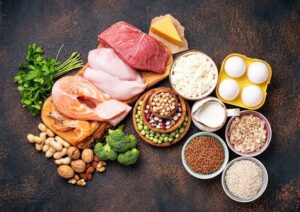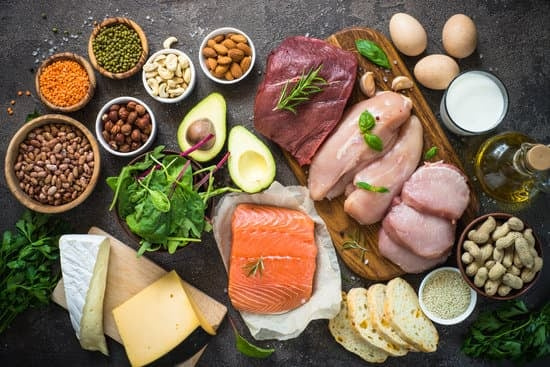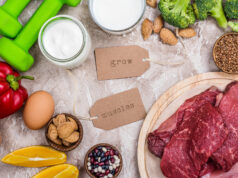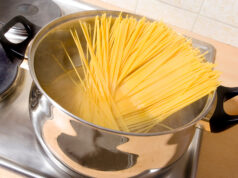Foods Rich in protein to gain weight
For individuals looking to increase their muscle mass and overall body weight in a healthy way, it is essential to incorporate foods Rich in protein to gain weight, such as lean meats, eggs, dairy products, nuts, and legumes, as these provide the necessary nutrients and amino acids required for muscle growth and recovery after intense workouts.
Protein is a macronutrient made up of amino acids, which are the building blocks of the body. It is essential for muscle growth, tissue repair, enzyme production, hormone regulation, and overall body function.
Proteins, made of 20 amino acids (9 essential ones from food), support muscles, skin, hair, immune system, and metabolism, and can be found in both animal-based sources (meat, eggs, dairy) and plant-based sources (beans, nuts, seeds, grains), playing a crucial role in the body’s structure and function.
The daily protein requirement varies based on activity level: sedentary adults need 0.8g per kg of body weight, while athletes and active individuals require between 1.2g to 2.0g per kg to support muscle repair, recovery, and overall performance.

1. Animal-Based Protein Sources
- Chicken Breast & Thighs : Rich in protein and can be cooked in various ways.
- Beef (Steak, Ground Beef, Ribs) : High in protein and calories, especially fatty cuts.
- Eggs & Whole Eggs : Packed with protein and healthy fats.
- Fish (Salmon, Tuna, Sardines, Mackerel) : High in protein and healthy omega-3 fats.
- Dairy Products (Milk, Cheese, Yogurt, Cottage Cheese) : Full of protein, calcium, and healthy fats.
- Turkey : A lean protein source that can be calorie-dense when prepared with healthy fats.
2. Plant-Based Protein Sources
- Lentils & Beans (Chickpeas, Black Beans, Kidney Beans) : High in protein, fiber, and complex carbs.
- Tofu & Tempeh : Excellent plant-based proteins with good fats.
- Quinoa : A complete plant protein with essential amino acids.
- Nuts & Nut Butters (Almonds, Peanuts, Cashews, Walnuts) : High in protein and healthy fats.
- Seeds (Chia, Flax, Sunflower, Pumpkin Seeds) : Small but packed with protein and calories.
3. Protein-Rich Supplements
- Whey or Plant-Based Protein Powders : A convenient way to boost protein intake.
- Mass Gainers : High-calorie protein shakes for weight gain.
How to include protein in your meals for a balanced diet
1. Protein Sources Derived from Animals
Animal proteins are complete proteins, meaning they contain all the essential amino acids needed for muscle growth.
A. Meat & Poultry
| Food | Protein per 100g | Calories per 100g | Benefits |
|---|---|---|---|
| Chicken Breast | 31g | 165 kcal | Lean protein, muscle growth |
| Chicken Thighs | 24g | 209 kcal | More calories, juicier meat |
| Beef (Steak, Ground Beef) | 25-30g | 250-350 kcal | High in iron, supports muscle mass |
| Lamb | 25g | 280 kcal | Rich in omega-3 and iron |
| Turkey | 29g | 135 kcal | Low-fat, high protein |
To increase calorie intake, grill, bake, or stir-fry with olive oil, prepare chicken sandwiches, beef burgers, or stir-fried turkey with rice, and use ground beef or lamb in pasta, wraps, or stews, while incorporating high-calorie toppings like cheese, avocado, or nuts, and choosing whole-grain options for added nutrition.
B. Fish & Seafood
| Food | Protein per 100g | Calories per 100g | Benefits |
|---|---|---|---|
| Salmon | 25g | 208 kcal | High in omega-3 fats, heart health |
| Tuna | 29g | 132 kcal | Lean protein, great for muscle gain |
| Sardines | 25g | 208 kcal | High in calcium, good for bones |
| Mackerel | 24g | 262 kcal | Omega-3 rich, good for brain function |
To eat more, consider incorporating grilled or baked fish with butter or olive oil, tuna or salmon sandwiches made with whole wheat bread, and sardines on toast with avocado, all of which provide a mix of healthy fats, protein, and whole grains to support a balanced diet and promote satiety.
C. Eggs & Dairy
| Food | Protein per 100g | Calories per 100g | Benefits |
|---|---|---|---|
| Whole Eggs | 13g | 155 kcal | High in healthy fats and vitamins |
| Greek Yogurt (Full Fat) | 10g | 120 kcal | Gut health, high protein |
| Milk (Whole) | 3.4g | 60 kcal | Calcium, vitamin D |
| Cheese (Cheddar, Mozzarella) | 25g | 350-400 kcal | High in protein and fat |
| Cottage Cheese | 11g | 98 kcal | Low-fat, good protein |
To eat more, try drinking whole milk or adding it to smoothies, making omelets with cheese and veggies, snacking on yogurt with nuts and honey, and adding cheese to sandwiches, pasta, and soups, along with incorporating calorie-dense foods like avocado, nut butter, or granola into meals, and including healthy fats such as olive oil, seeds, and fatty fish to boost your intake in a nutritious way.
2. Protein Sources Derived from Plants
Plant proteins are great for vegetarians and vegans but often lack one or more essential amino acids. Combining different plant proteins helps get a complete protein profile.
| Food | Protein per 100g | Calories per 100g | Benefits |
|---|---|---|---|
| Lentils | 9g | 116 kcal | High in fiber, good for digestion |
| Chickpeas | 19g | 364 kcal | Protein-rich, helps muscle gain |
| Black Beans | 21g | 339 kcal | High in fiber and iron |
| Quinoa | 4g | 120 kcal | Complete protein, good for energy |
| Tofu | 8g | 144 kcal | High in plant protein and calcium |
| Tempeh | 19g | 195 kcal | Fermented, easy to digest |
To eat more, you can make lentil soup or chickpea curry, add quinoa to salads or bowls, stir-fry tofu with soy sauce and veggies, and enjoy hummus with whole wheat bread, while also incorporating other nutrient-dense foods like avocado, nuts, seeds, and leafy greens into your meals to increase caloric intake in a healthy way.
3. Nuts, Seeds & Healthy Fats
Nuts and seeds are high in protein and healthy fats, making them great for weight gain.
| Food | Protein per 100g | Calories per 100g | Benefits |
|---|---|---|---|
| Almonds | 21g | 579 kcal | Good for brain health |
| Peanuts | 25g | 567 kcal | High in protein and energy |
| Cashews | 18g | 553 kcal | Rich in magnesium |
| Walnuts | 15g | 654 kcal | Omega-3 for heart health |
| Pumpkin Seeds | 30g | 559 kcal | High in zinc and magnesium |
To eat more, snack on a handful of nuts daily, such as almonds, cashews, or peanuts; spread peanut or almond butter on toast, bananas, or add it to smoothies; and boost your meals by sprinkling flaxseeds, chia seeds, or pumpkin seeds into yogurt, oats, or salads, while also considering including protein-rich foods, healthy fats, and calorie-dense snacks to increase your intake effectively.
4. Supplements Rich in Protein
If you’re struggling to get enough protein from food alone, consider adding supplements.
| Supplement | Protein per serving | Calories per serving | Benefits |
|---|---|---|---|
| Whey Protein | 20-30g | 100-150 kcal | Quick digestion, muscle recovery |
| Casein Protein | 24g | 120 kcal | Slow digestion, great before bed |
| Plant-Based Protein (Pea, Rice, Soy) | 15-25g | 100-150 kcal | Vegan-friendly protein option |
| Mass Gainers | 30-50g | 400-1200 kcal | High-calorie for weight gain |
To use effectively, add whey protein to shakes with banana, oats, and peanut butter for a nutritious boost, drink a protein smoothie post-workout to aid recovery, and incorporate casein protein before bed to prevent muscle breakdown and support overnight muscle repair. Additionally, ensure you stay consistent with protein intake throughout the day to maximize muscle growth and recovery.
5. Meal Plan for Rich-Protein Weight Gain
Here’s a sample meal plan to help you gain weight with high protein intake:
Breakfast
- 3 whole eggs scrambled with cheese & whole wheat toast
- Greek yogurt with honey & almonds
- Glass of whole milk
Lunch
- Grilled chicken breast with brown rice & veggies
- Lentil soup with whole wheat bread
- Cheese cubes
Snack
- Handful of nuts & dried fruits
- Smoothie with tofu, banana, and almond butter
Dinner
- Salmon with quinoa & avocado
- Tempeh stir-fry with rice & vegetables
- Cottage cheese with flaxseeds
Final Tips to Gain Weight with Protein for effective muscle growth
To gain weight effectively, aim to eat more frequently by having 5-6 meals a day, increase portion sizes with extra servings of protein-rich foods, drink high-calorie smoothies made with milk, nut butter, protein powder, and fruits, and cook with healthy oils like olive oil, coconut oil, or butter to add extra calories while maintaining nutritional balance. Additionally, focus on incorporating whole grains, nuts, and seeds into your meals, and ensure proper hydration with calorie-dense beverages to support muscle growth and overall weight gain.
Read more about foods rich in iron for infants





[…] Hummus – adds creaminess and plant-based protein […]